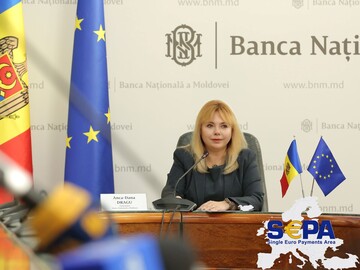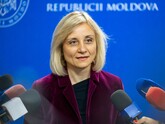
On October 6, Moldova became part of the Single Euro Payments Area (SEPA), which opened up access to fast, secure, and inexpensive payments in euros
As announced by the National Bank of Moldova (NBM), on October 6, Moldova became part of the SEPA infrastructure, which unites 41 European countries and offers citizens and companies fast, secure, and inexpensive transfers in euros, sometimes with zero commission. The Governor of the National Bank of Moldova, Anca Dragu, emphasized that Moldova's integration into SEPA is a historic moment for the national financial system and confirms the country's European path. “This achievement removes administrative barriers and brings European standards directly into the daily lives of people and businesses in Moldova,” she said, recalling that the NBM coordinated and implemented the process of Moldova's accession to SEPA (Single Euro Payments Area). SEPA is a European system that allows transfers in euros between the payment systems of participating countries on the same terms of cost, security, and processing time, regardless of borders. SEPA brings together all European Union countries, as well as the United Kingdom, European Economic Area countries, Switzerland, Andorra, Monaco, San Marino, and the Vatican. Moldova's accession to SEPA brings immediate and tangible benefits to citizens, the diaspora, companies, and the economy as a whole. For citizens and families in the diaspora, transfers in euros will become faster, safer, and significantly cheaper, sometimes even with zero commission, depending on the services of participating banks. Whereas previously an international transfer could cost between €20 and €200, it will now be processed according to the same standards and tariffs as in the EU, for just a few euros or even free of charge. For the business environment, SEPA removes administrative barriers and puts Moldovan companies on an equal footing with European ones. More than 60% of Moldovan exports are oriented towards the EU, and low transaction costs increase competitiveness and promote trade and investment. Statistics show that in 2024, approximately 830 thousand transactions in euros worth €11.8 billion were carried out between Moldova and SEPA countries, i.e., more than 3,200 payments worth €45 million were made daily. From now on, these financial flows will be managed much more efficiently and at lower cost, directly through the SEPA system. At the macroeconomic level, integration into the SEPA zone provides direct savings estimated at around €20 million, which allows resources to be retained in the economy for investment, business development, and job creation. At the same time, joining SEPA sends a powerful signal of stability and confidence to international partners and investors. Currently, 8 out of 10 commercial banks in Moldova have obtained SEPA participant status and can process payments in euros according to the same standards as in the European Union. This guarantees faster, safer, and more economical transfers in accordance with the rules of the European payment system. The National Bank of Moldova emphasizes that each customer should contact their bank to find out the conditions for SEPA transfers, including tariffs and types of services available (standard payments or instant payments). In the near future, other payment service providers, including non-bank operators, may become SEPA participants, contributing to the modernization of the local payments market. "This moment is the result of joint efforts: the teams of the National Bank, the government, the parliament, our European and international partners. I would like to express gratitude to everyone who participated in the implementation of this project," said Anca Dragu, Governor of the National Bank of Moldova, in a video message published by the NBM in the context of the country's operational integration into SEPA. According to Anca Dragu, this achievement confirms Moldova's European path and sends a signal of confidence to investors, demonstrating that our financial system is stable, modern, and compliant with European standards. Moldova initiated the process of joining SEPA on January 30, 2024, by submitting an official application to the European Payments Council (EPC). On March 6, 2025, the EPC approved Moldova's inclusion in the SEPA geographical area, noting the significant progress made in bringing the prudential and regulatory framework into line with European standards. // 06.10.2025 — InfoMarket







